University Report: CEO Leadership Competency Analysis (MGT811)
VerifiedAdded on 2022/11/22
|9
|2273
|178
Report
AI Summary
This report presents a critical analysis of a CEO's leadership competencies in response to accusations of sexual harassment, focusing on the "key personal competencies" approach. The report examines the situation through the lens of ten major leadership competencies, including social and emotional intelligence, interpersonal skills, and conflict management. It assesses the CEO's behavior in light of these competencies, considering the impact of the allegations on his image and the organization. The analysis includes recommendations for the board on how to evaluate the CEO's past behavior and current actions. The report also discusses the importance of leadership development, including the need for speed, passion, and agility, to foster effective relationships within the organization. The report concludes by emphasizing the significance of interpersonal relationships and other leadership competencies in analyzing the CEO's behavior and providing insights into effective leadership and management.
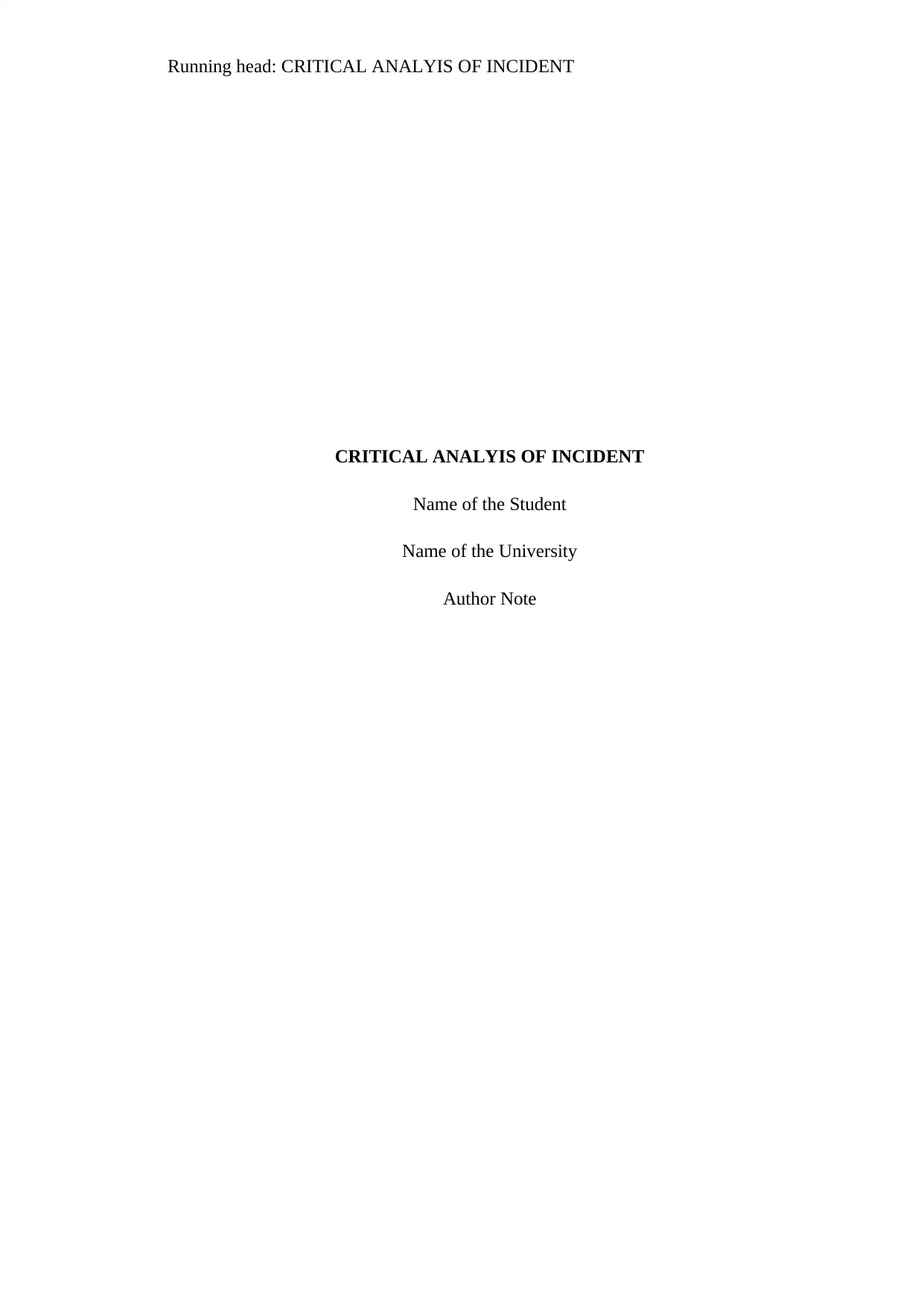
Running head: CRITICAL ANALYIS OF INCIDENT
CRITICAL ANALYIS OF INCIDENT
Name of the Student
Name of the University
Author Note
CRITICAL ANALYIS OF INCIDENT
Name of the Student
Name of the University
Author Note
Paraphrase This Document
Need a fresh take? Get an instant paraphrase of this document with our AI Paraphraser
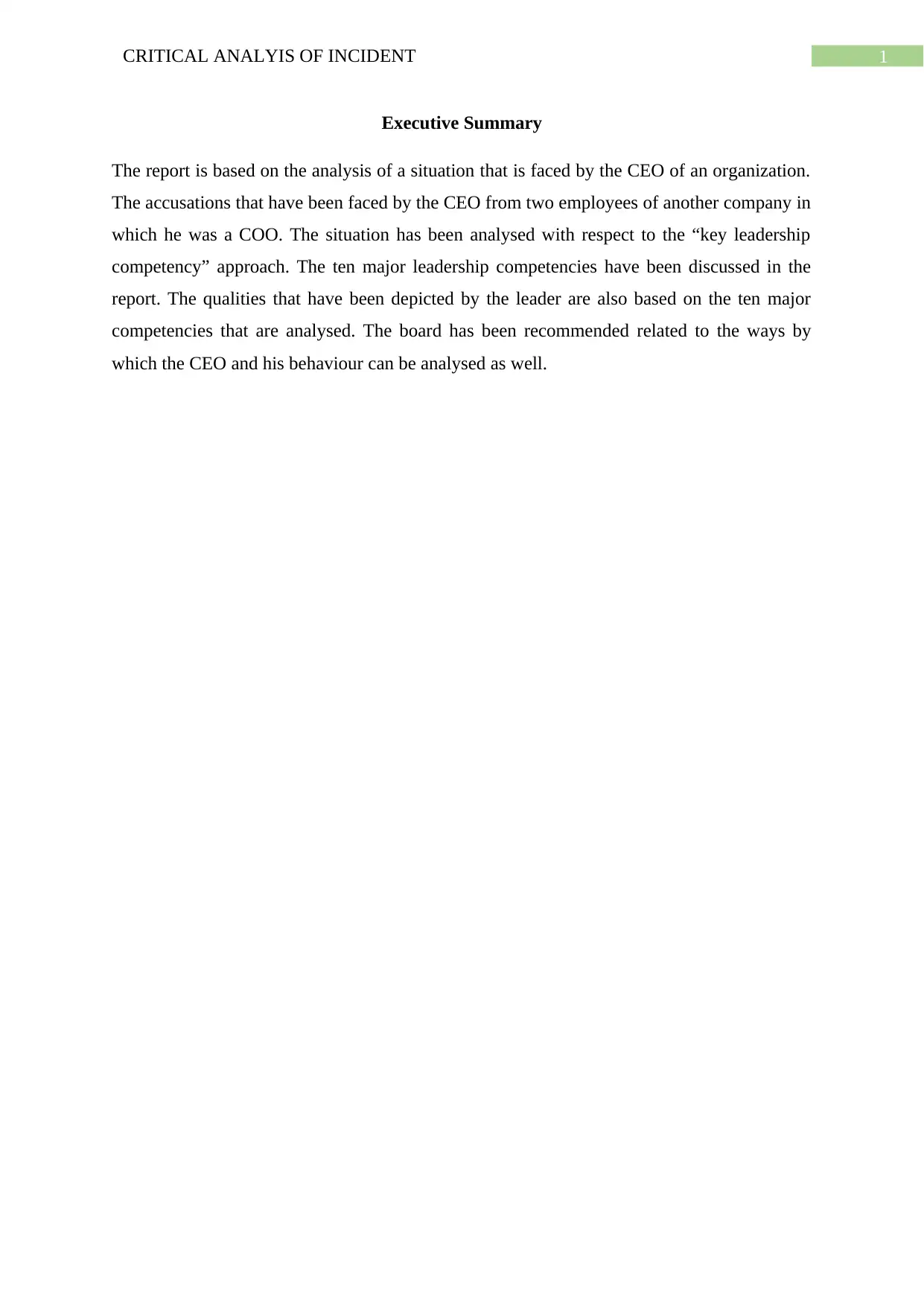
1CRITICAL ANALYIS OF INCIDENT
Executive Summary
The report is based on the analysis of a situation that is faced by the CEO of an organization.
The accusations that have been faced by the CEO from two employees of another company in
which he was a COO. The situation has been analysed with respect to the “key leadership
competency” approach. The ten major leadership competencies have been discussed in the
report. The qualities that have been depicted by the leader are also based on the ten major
competencies that are analysed. The board has been recommended related to the ways by
which the CEO and his behaviour can be analysed as well.
Executive Summary
The report is based on the analysis of a situation that is faced by the CEO of an organization.
The accusations that have been faced by the CEO from two employees of another company in
which he was a COO. The situation has been analysed with respect to the “key leadership
competency” approach. The ten major leadership competencies have been discussed in the
report. The qualities that have been depicted by the leader are also based on the ten major
competencies that are analysed. The board has been recommended related to the ways by
which the CEO and his behaviour can be analysed as well.
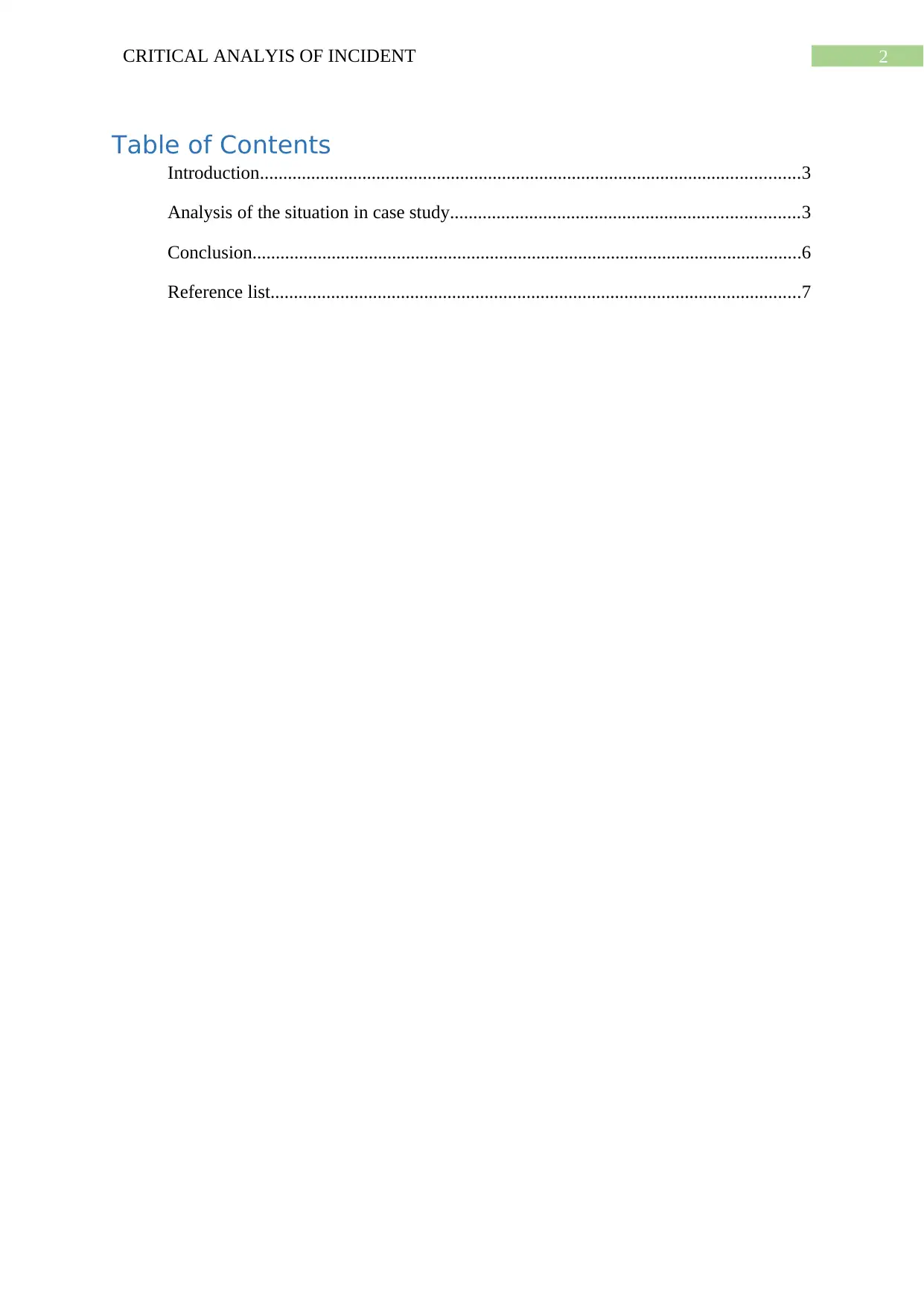
2CRITICAL ANALYIS OF INCIDENT
Table of Contents
Introduction....................................................................................................................3
Analysis of the situation in case study...........................................................................3
Conclusion......................................................................................................................6
Reference list..................................................................................................................7
Table of Contents
Introduction....................................................................................................................3
Analysis of the situation in case study...........................................................................3
Conclusion......................................................................................................................6
Reference list..................................................................................................................7
⊘ This is a preview!⊘
Do you want full access?
Subscribe today to unlock all pages.

Trusted by 1+ million students worldwide
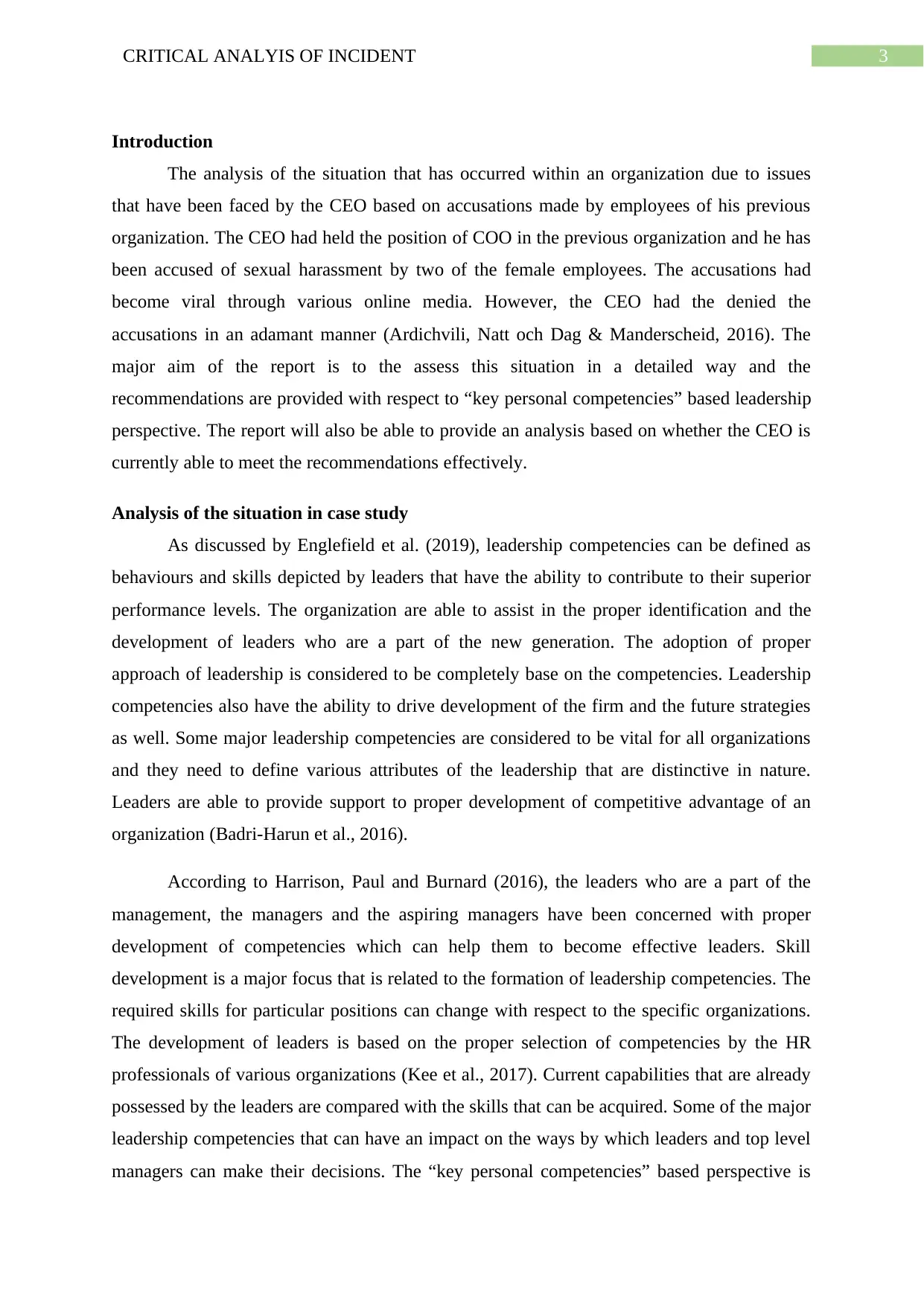
3CRITICAL ANALYIS OF INCIDENT
Introduction
The analysis of the situation that has occurred within an organization due to issues
that have been faced by the CEO based on accusations made by employees of his previous
organization. The CEO had held the position of COO in the previous organization and he has
been accused of sexual harassment by two of the female employees. The accusations had
become viral through various online media. However, the CEO had the denied the
accusations in an adamant manner (Ardichvili, Natt och Dag & Manderscheid, 2016). The
major aim of the report is to the assess this situation in a detailed way and the
recommendations are provided with respect to “key personal competencies” based leadership
perspective. The report will also be able to provide an analysis based on whether the CEO is
currently able to meet the recommendations effectively.
Analysis of the situation in case study
As discussed by Englefield et al. (2019), leadership competencies can be defined as
behaviours and skills depicted by leaders that have the ability to contribute to their superior
performance levels. The organization are able to assist in the proper identification and the
development of leaders who are a part of the new generation. The adoption of proper
approach of leadership is considered to be completely base on the competencies. Leadership
competencies also have the ability to drive development of the firm and the future strategies
as well. Some major leadership competencies are considered to be vital for all organizations
and they need to define various attributes of the leadership that are distinctive in nature.
Leaders are able to provide support to proper development of competitive advantage of an
organization (Badri-Harun et al., 2016).
According to Harrison, Paul and Burnard (2016), the leaders who are a part of the
management, the managers and the aspiring managers have been concerned with proper
development of competencies which can help them to become effective leaders. Skill
development is a major focus that is related to the formation of leadership competencies. The
required skills for particular positions can change with respect to the specific organizations.
The development of leaders is based on the proper selection of competencies by the HR
professionals of various organizations (Kee et al., 2017). Current capabilities that are already
possessed by the leaders are compared with the skills that can be acquired. Some of the major
leadership competencies that can have an impact on the ways by which leaders and top level
managers can make their decisions. The “key personal competencies” based perspective is
Introduction
The analysis of the situation that has occurred within an organization due to issues
that have been faced by the CEO based on accusations made by employees of his previous
organization. The CEO had held the position of COO in the previous organization and he has
been accused of sexual harassment by two of the female employees. The accusations had
become viral through various online media. However, the CEO had the denied the
accusations in an adamant manner (Ardichvili, Natt och Dag & Manderscheid, 2016). The
major aim of the report is to the assess this situation in a detailed way and the
recommendations are provided with respect to “key personal competencies” based leadership
perspective. The report will also be able to provide an analysis based on whether the CEO is
currently able to meet the recommendations effectively.
Analysis of the situation in case study
As discussed by Englefield et al. (2019), leadership competencies can be defined as
behaviours and skills depicted by leaders that have the ability to contribute to their superior
performance levels. The organization are able to assist in the proper identification and the
development of leaders who are a part of the new generation. The adoption of proper
approach of leadership is considered to be completely base on the competencies. Leadership
competencies also have the ability to drive development of the firm and the future strategies
as well. Some major leadership competencies are considered to be vital for all organizations
and they need to define various attributes of the leadership that are distinctive in nature.
Leaders are able to provide support to proper development of competitive advantage of an
organization (Badri-Harun et al., 2016).
According to Harrison, Paul and Burnard (2016), the leaders who are a part of the
management, the managers and the aspiring managers have been concerned with proper
development of competencies which can help them to become effective leaders. Skill
development is a major focus that is related to the formation of leadership competencies. The
required skills for particular positions can change with respect to the specific organizations.
The development of leaders is based on the proper selection of competencies by the HR
professionals of various organizations (Kee et al., 2017). Current capabilities that are already
possessed by the leaders are compared with the skills that can be acquired. Some of the major
leadership competencies that can have an impact on the ways by which leaders and top level
managers can make their decisions. The “key personal competencies” based perspective is
Paraphrase This Document
Need a fresh take? Get an instant paraphrase of this document with our AI Paraphraser

4CRITICAL ANALYIS OF INCIDENT
able to play a major role in the analysis of the behaviour that is depicted by the CEO
(Hassanzadeh et al., 2015).
The major competencies that are considered for the development of proper leadership
in the organization are as follows,
1) Social intelligence – The proper development of social intelligence is
considered to be a major competency based on the proper understanding of the
various social situations. Social intelligence is considered to be a quality that
is related to the sensitivity that leaders have towards the social situations.
Proper leadership is influenced in a huge manner by the levels of social
intelligence.
2) Interpersonal skills – Interpersonal skills are considered to be an important
part of the social intelligence based qualities that are acquired by the leaders.
The soft skills that are develop with respect to leadership are more
relationship-oriented in nature. The leaders with effective interpersonal skills
are considered to be better listeners (Kiersch & Peters, 2017).
3) Emotional intelligence – Emotional intelligence is able to complement the
levels of social intelligence and the levels of communication that are made by
leaders are at emotional levels. The leaders are also able to communicate with
the subordinates at an emotional level.
4) Prudence – The competency of leaders to listen to others is related to the
proper development of prudence. The broad minded leaders are able to
manage the employees and listen to their demands and needs as well (Le
Comte & McClelland, 2017).
5) Courage – The strength of personal values is an important factor that helps in
the development of proper leadership competency. The levels of courage that
have been gained by the leaders have an impact on the competencies that are
formed.
6) Conflict management – The competency is considered to be an interpersonal
skill that belongs to the higher order that is related to the ways by which
leaders are able to resolve the conflicts that have occurred among the
employees. The conflict management skills are important for the leaders in
modern organizations (Maduka et al., 2018).
able to play a major role in the analysis of the behaviour that is depicted by the CEO
(Hassanzadeh et al., 2015).
The major competencies that are considered for the development of proper leadership
in the organization are as follows,
1) Social intelligence – The proper development of social intelligence is
considered to be a major competency based on the proper understanding of the
various social situations. Social intelligence is considered to be a quality that
is related to the sensitivity that leaders have towards the social situations.
Proper leadership is influenced in a huge manner by the levels of social
intelligence.
2) Interpersonal skills – Interpersonal skills are considered to be an important
part of the social intelligence based qualities that are acquired by the leaders.
The soft skills that are develop with respect to leadership are more
relationship-oriented in nature. The leaders with effective interpersonal skills
are considered to be better listeners (Kiersch & Peters, 2017).
3) Emotional intelligence – Emotional intelligence is able to complement the
levels of social intelligence and the levels of communication that are made by
leaders are at emotional levels. The leaders are also able to communicate with
the subordinates at an emotional level.
4) Prudence – The competency of leaders to listen to others is related to the
proper development of prudence. The broad minded leaders are able to
manage the employees and listen to their demands and needs as well (Le
Comte & McClelland, 2017).
5) Courage – The strength of personal values is an important factor that helps in
the development of proper leadership competency. The levels of courage that
have been gained by the leaders have an impact on the competencies that are
formed.
6) Conflict management – The competency is considered to be an interpersonal
skill that belongs to the higher order that is related to the ways by which
leaders are able to resolve the conflicts that have occurred among the
employees. The conflict management skills are important for the leaders in
modern organizations (Maduka et al., 2018).

5CRITICAL ANALYIS OF INCIDENT
7) Decision making – The leaders of organizations need to have the ability to
make good decisions and this is a major core competency that is gained by
them. The ways by which decisions are made have an impact on the
subordinates and peers of the leaders.
8) Political skills – The leaders also need to have a capability of becoming an
effective political player and have to manage the political behaviours that have
been depicted by them as well (Norzailan, Yusof & Othman, 2016).
9) Influence skills – A great leader is able to influence the employees or
subordinates who work under them. The soft or interpersonal skills have been
able to play a major role in providing influence on the employees who are a
part of the organization.
10) Expertise or area competence – The expertise or competence that is gained by
a leader in a particular area is an important factor that has an impact on the
employees and organizations as well (Owen, 2015).
The ten major areas of key competencies that have been mentioned above are able to
play a major role in the ways by which the CEO of the organization and his behaviour can be
analysed. The accusations that have been made by employees of the organization in which he
had worked previously are able to influence the image that has been formed by him. The
competencies that have been discussed above are able to play a major role in the ways by
which the CEO maintains his behaviour within the organization. The incident had become
viral and the two female employees had provided their separate responses based on the
accusations. The current CEO of the organization had gained the position of COO previously
in another organization (Norzailan, Yusof & Othman, 2016).
The key competencies will be able to play a major role in decisions that are made by
the CEO of the firm based on the situations that have taken place within the organization in
the last few years. The competencies of the leader will be able to play a major role in the
ways by which employees are managed and their demands are fulfilled as well. The CEO
needs to implement the competencies in an effective manner in order to understand the
employees and their work process as well. The social intelligence is also considered to be an
important factor that is able to influence the decisions that are made by the CEO. Social
situations can be assessed in an effective manner with the help of this competency (Tinnish &
Lynch, 2017).
7) Decision making – The leaders of organizations need to have the ability to
make good decisions and this is a major core competency that is gained by
them. The ways by which decisions are made have an impact on the
subordinates and peers of the leaders.
8) Political skills – The leaders also need to have a capability of becoming an
effective political player and have to manage the political behaviours that have
been depicted by them as well (Norzailan, Yusof & Othman, 2016).
9) Influence skills – A great leader is able to influence the employees or
subordinates who work under them. The soft or interpersonal skills have been
able to play a major role in providing influence on the employees who are a
part of the organization.
10) Expertise or area competence – The expertise or competence that is gained by
a leader in a particular area is an important factor that has an impact on the
employees and organizations as well (Owen, 2015).
The ten major areas of key competencies that have been mentioned above are able to
play a major role in the ways by which the CEO of the organization and his behaviour can be
analysed. The accusations that have been made by employees of the organization in which he
had worked previously are able to influence the image that has been formed by him. The
competencies that have been discussed above are able to play a major role in the ways by
which the CEO maintains his behaviour within the organization. The incident had become
viral and the two female employees had provided their separate responses based on the
accusations. The current CEO of the organization had gained the position of COO previously
in another organization (Norzailan, Yusof & Othman, 2016).
The key competencies will be able to play a major role in decisions that are made by
the CEO of the firm based on the situations that have taken place within the organization in
the last few years. The competencies of the leader will be able to play a major role in the
ways by which employees are managed and their demands are fulfilled as well. The CEO
needs to implement the competencies in an effective manner in order to understand the
employees and their work process as well. The social intelligence is also considered to be an
important factor that is able to influence the decisions that are made by the CEO. Social
situations can be assessed in an effective manner with the help of this competency (Tinnish &
Lynch, 2017).
⊘ This is a preview!⊘
Do you want full access?
Subscribe today to unlock all pages.

Trusted by 1+ million students worldwide
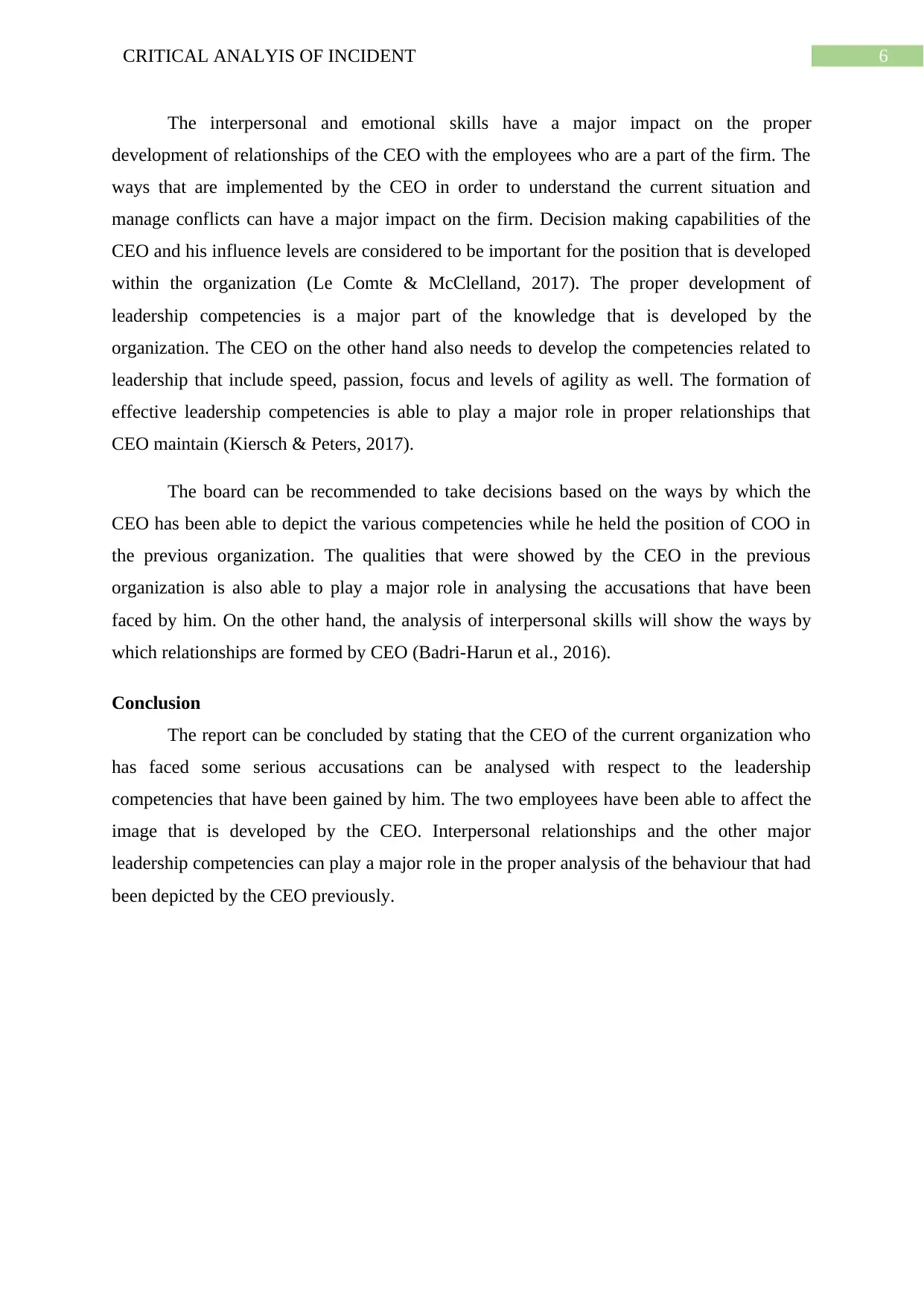
6CRITICAL ANALYIS OF INCIDENT
The interpersonal and emotional skills have a major impact on the proper
development of relationships of the CEO with the employees who are a part of the firm. The
ways that are implemented by the CEO in order to understand the current situation and
manage conflicts can have a major impact on the firm. Decision making capabilities of the
CEO and his influence levels are considered to be important for the position that is developed
within the organization (Le Comte & McClelland, 2017). The proper development of
leadership competencies is a major part of the knowledge that is developed by the
organization. The CEO on the other hand also needs to develop the competencies related to
leadership that include speed, passion, focus and levels of agility as well. The formation of
effective leadership competencies is able to play a major role in proper relationships that
CEO maintain (Kiersch & Peters, 2017).
The board can be recommended to take decisions based on the ways by which the
CEO has been able to depict the various competencies while he held the position of COO in
the previous organization. The qualities that were showed by the CEO in the previous
organization is also able to play a major role in analysing the accusations that have been
faced by him. On the other hand, the analysis of interpersonal skills will show the ways by
which relationships are formed by CEO (Badri-Harun et al., 2016).
Conclusion
The report can be concluded by stating that the CEO of the current organization who
has faced some serious accusations can be analysed with respect to the leadership
competencies that have been gained by him. The two employees have been able to affect the
image that is developed by the CEO. Interpersonal relationships and the other major
leadership competencies can play a major role in the proper analysis of the behaviour that had
been depicted by the CEO previously.
The interpersonal and emotional skills have a major impact on the proper
development of relationships of the CEO with the employees who are a part of the firm. The
ways that are implemented by the CEO in order to understand the current situation and
manage conflicts can have a major impact on the firm. Decision making capabilities of the
CEO and his influence levels are considered to be important for the position that is developed
within the organization (Le Comte & McClelland, 2017). The proper development of
leadership competencies is a major part of the knowledge that is developed by the
organization. The CEO on the other hand also needs to develop the competencies related to
leadership that include speed, passion, focus and levels of agility as well. The formation of
effective leadership competencies is able to play a major role in proper relationships that
CEO maintain (Kiersch & Peters, 2017).
The board can be recommended to take decisions based on the ways by which the
CEO has been able to depict the various competencies while he held the position of COO in
the previous organization. The qualities that were showed by the CEO in the previous
organization is also able to play a major role in analysing the accusations that have been
faced by him. On the other hand, the analysis of interpersonal skills will show the ways by
which relationships are formed by CEO (Badri-Harun et al., 2016).
Conclusion
The report can be concluded by stating that the CEO of the current organization who
has faced some serious accusations can be analysed with respect to the leadership
competencies that have been gained by him. The two employees have been able to affect the
image that is developed by the CEO. Interpersonal relationships and the other major
leadership competencies can play a major role in the proper analysis of the behaviour that had
been depicted by the CEO previously.
Paraphrase This Document
Need a fresh take? Get an instant paraphrase of this document with our AI Paraphraser
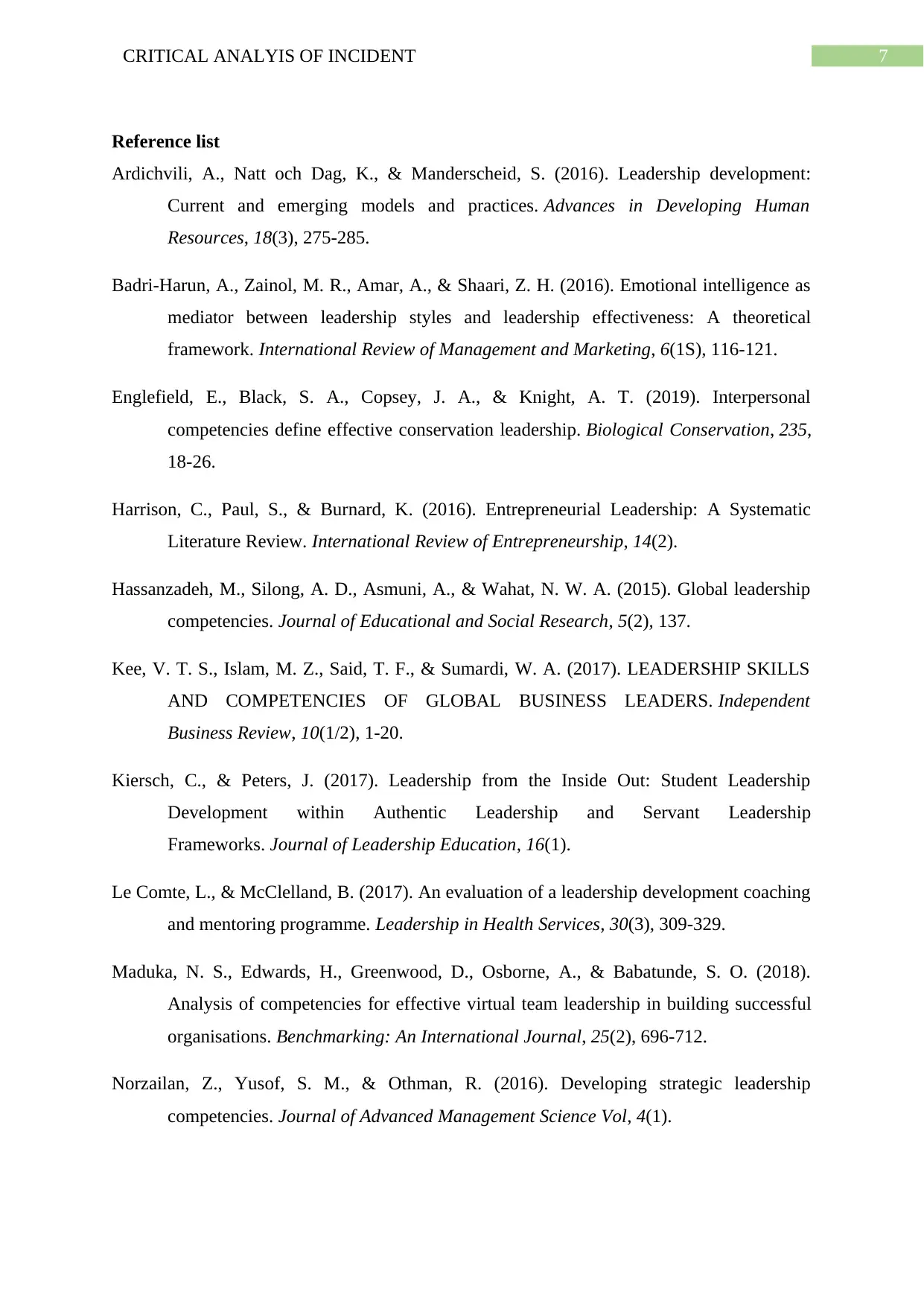
7CRITICAL ANALYIS OF INCIDENT
Reference list
Ardichvili, A., Natt och Dag, K., & Manderscheid, S. (2016). Leadership development:
Current and emerging models and practices. Advances in Developing Human
Resources, 18(3), 275-285.
Badri-Harun, A., Zainol, M. R., Amar, A., & Shaari, Z. H. (2016). Emotional intelligence as
mediator between leadership styles and leadership effectiveness: A theoretical
framework. International Review of Management and Marketing, 6(1S), 116-121.
Englefield, E., Black, S. A., Copsey, J. A., & Knight, A. T. (2019). Interpersonal
competencies define effective conservation leadership. Biological Conservation, 235,
18-26.
Harrison, C., Paul, S., & Burnard, K. (2016). Entrepreneurial Leadership: A Systematic
Literature Review. International Review of Entrepreneurship, 14(2).
Hassanzadeh, M., Silong, A. D., Asmuni, A., & Wahat, N. W. A. (2015). Global leadership
competencies. Journal of Educational and Social Research, 5(2), 137.
Kee, V. T. S., Islam, M. Z., Said, T. F., & Sumardi, W. A. (2017). LEADERSHIP SKILLS
AND COMPETENCIES OF GLOBAL BUSINESS LEADERS. Independent
Business Review, 10(1/2), 1-20.
Kiersch, C., & Peters, J. (2017). Leadership from the Inside Out: Student Leadership
Development within Authentic Leadership and Servant Leadership
Frameworks. Journal of Leadership Education, 16(1).
Le Comte, L., & McClelland, B. (2017). An evaluation of a leadership development coaching
and mentoring programme. Leadership in Health Services, 30(3), 309-329.
Maduka, N. S., Edwards, H., Greenwood, D., Osborne, A., & Babatunde, S. O. (2018).
Analysis of competencies for effective virtual team leadership in building successful
organisations. Benchmarking: An International Journal, 25(2), 696-712.
Norzailan, Z., Yusof, S. M., & Othman, R. (2016). Developing strategic leadership
competencies. Journal of Advanced Management Science Vol, 4(1).
Reference list
Ardichvili, A., Natt och Dag, K., & Manderscheid, S. (2016). Leadership development:
Current and emerging models and practices. Advances in Developing Human
Resources, 18(3), 275-285.
Badri-Harun, A., Zainol, M. R., Amar, A., & Shaari, Z. H. (2016). Emotional intelligence as
mediator between leadership styles and leadership effectiveness: A theoretical
framework. International Review of Management and Marketing, 6(1S), 116-121.
Englefield, E., Black, S. A., Copsey, J. A., & Knight, A. T. (2019). Interpersonal
competencies define effective conservation leadership. Biological Conservation, 235,
18-26.
Harrison, C., Paul, S., & Burnard, K. (2016). Entrepreneurial Leadership: A Systematic
Literature Review. International Review of Entrepreneurship, 14(2).
Hassanzadeh, M., Silong, A. D., Asmuni, A., & Wahat, N. W. A. (2015). Global leadership
competencies. Journal of Educational and Social Research, 5(2), 137.
Kee, V. T. S., Islam, M. Z., Said, T. F., & Sumardi, W. A. (2017). LEADERSHIP SKILLS
AND COMPETENCIES OF GLOBAL BUSINESS LEADERS. Independent
Business Review, 10(1/2), 1-20.
Kiersch, C., & Peters, J. (2017). Leadership from the Inside Out: Student Leadership
Development within Authentic Leadership and Servant Leadership
Frameworks. Journal of Leadership Education, 16(1).
Le Comte, L., & McClelland, B. (2017). An evaluation of a leadership development coaching
and mentoring programme. Leadership in Health Services, 30(3), 309-329.
Maduka, N. S., Edwards, H., Greenwood, D., Osborne, A., & Babatunde, S. O. (2018).
Analysis of competencies for effective virtual team leadership in building successful
organisations. Benchmarking: An International Journal, 25(2), 696-712.
Norzailan, Z., Yusof, S. M., & Othman, R. (2016). Developing strategic leadership
competencies. Journal of Advanced Management Science Vol, 4(1).
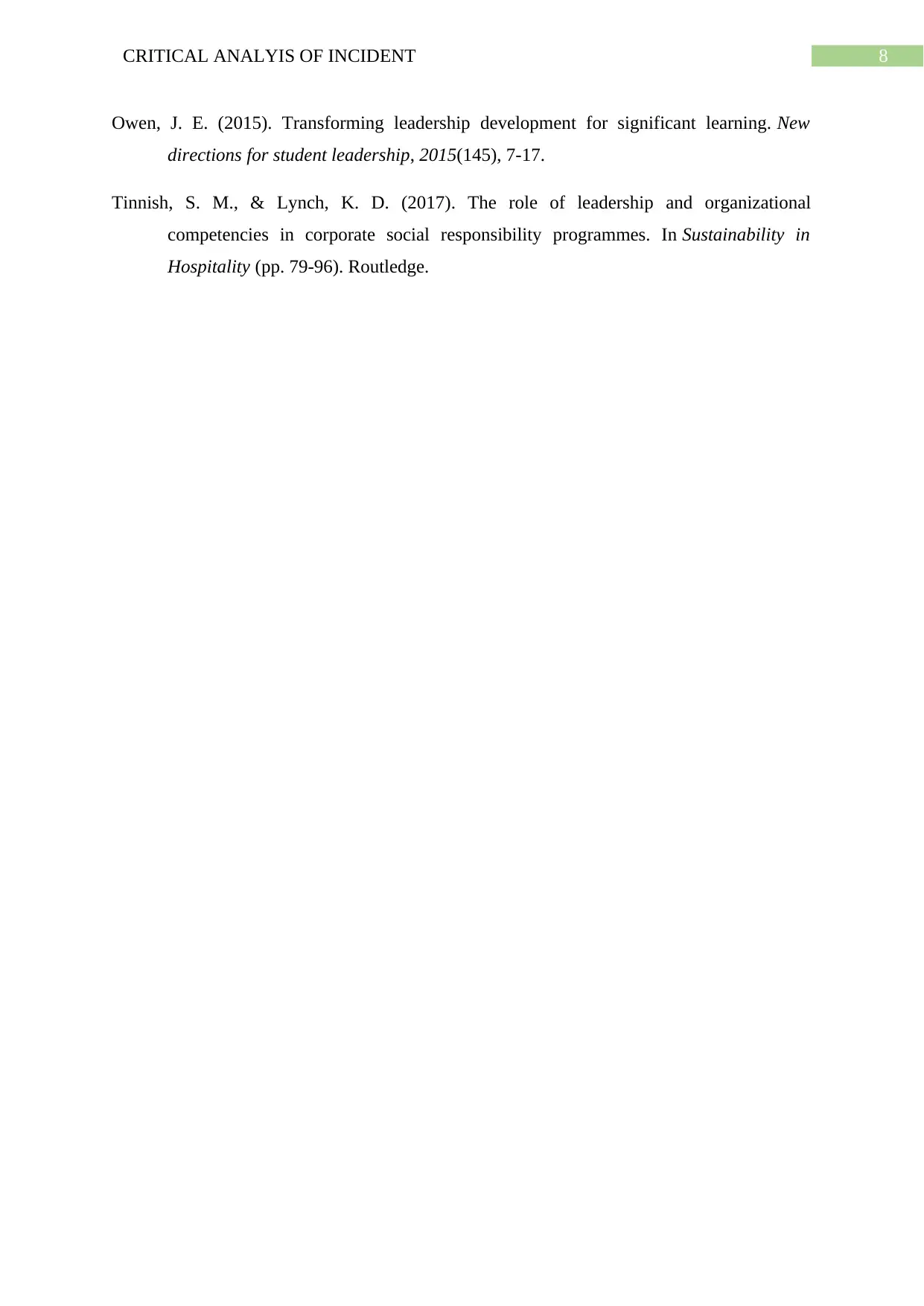
8CRITICAL ANALYIS OF INCIDENT
Owen, J. E. (2015). Transforming leadership development for significant learning. New
directions for student leadership, 2015(145), 7-17.
Tinnish, S. M., & Lynch, K. D. (2017). The role of leadership and organizational
competencies in corporate social responsibility programmes. In Sustainability in
Hospitality (pp. 79-96). Routledge.
Owen, J. E. (2015). Transforming leadership development for significant learning. New
directions for student leadership, 2015(145), 7-17.
Tinnish, S. M., & Lynch, K. D. (2017). The role of leadership and organizational
competencies in corporate social responsibility programmes. In Sustainability in
Hospitality (pp. 79-96). Routledge.
⊘ This is a preview!⊘
Do you want full access?
Subscribe today to unlock all pages.

Trusted by 1+ million students worldwide
1 out of 9
Related Documents
Your All-in-One AI-Powered Toolkit for Academic Success.
+13062052269
info@desklib.com
Available 24*7 on WhatsApp / Email
![[object Object]](/_next/static/media/star-bottom.7253800d.svg)
Unlock your academic potential
Copyright © 2020–2026 A2Z Services. All Rights Reserved. Developed and managed by ZUCOL.





